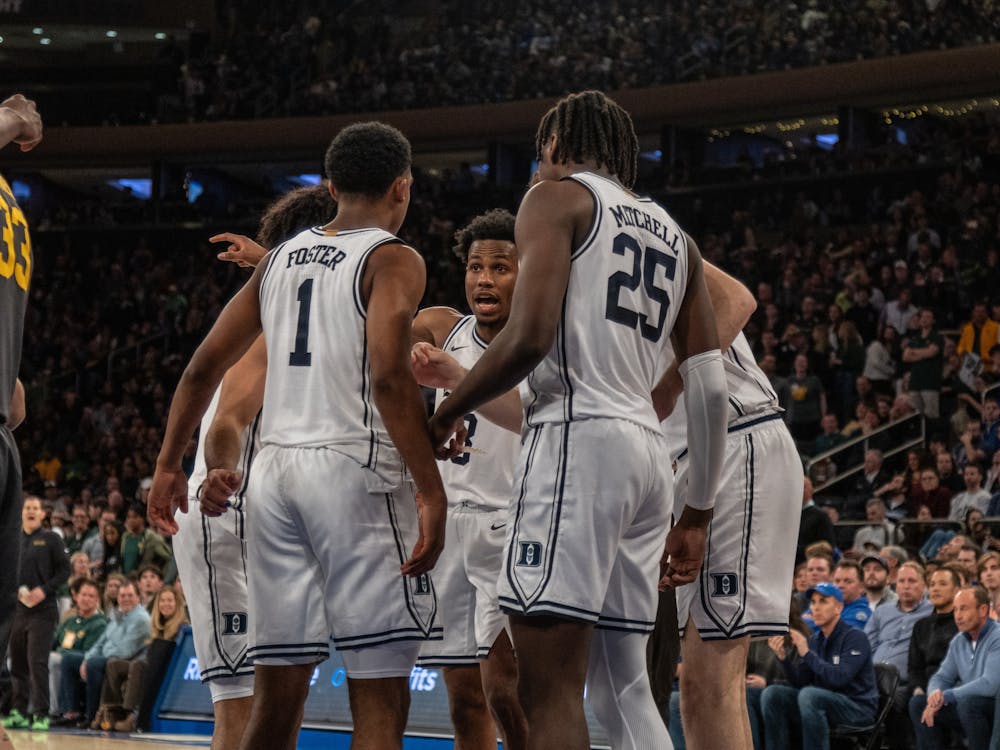The NCAA tournament bracket was released Sunday, and the tournament is set to tip off Thursday. The Blue Zone is here to break down the top teams and possible upsets in each region. Check out our previews for the West, East and Midwest regions as well:
The No. 1 seed: Houston Cougars
Houston has been inside the top five since Dec. 4 and has spent two of its final three weeks at No. 1. The Cougars sit (and have sat) at the top of the NET with their sterling 28-3 regular-season record. Senior guard Jamal Shead, the Big 12 Player of the Year and Defensive Player of the Year, has earned every one of his accolades. Prior to its stunning conference championship loss to Iowa State, Houston seemed to be a shoo-in for the top overall spot in the NCAA tournament. That run was spoiled, and the Cougars dropped to second overall, but that doesn’t make them any less of a formidable opponent — just one with revenge on their mind and a chip on their shoulder.
The senior backcourt duo of Shead and L.J. Cryer is a force to be reckoned with. When the two are on the court together, they boast a net rating of plus-35.2, an astounding tally. They combine for nearly 30 points per game. They do lack a true center, with 6-foot-8 Ja’Vier Francis leading the team in blocks and 6-foot-7 J’Wan Roberts leading in rebounding. A rebounding deficit (which it ended up at 11 times) hasn’t stopped Houston before, and it will look to keep rolling with its dominant backcourt.
The other contenders:
The presence of both No. 4-seed Duke and No. 3-seed Kentucky makes this an interesting region. The Blue Bloods are having funky years, with both teams churning through unstoppable chunks of games before running into invisible walls. Expectations are murky, though both have ceilings through the roof; their floors, though, could be just as extreme.
The Wildcats slot as the No. 3-seed doesn’t quite fit their ranking as 18th in NET and 19th in KenPom, nor does it align with their quarterfinal SEC tournament exit to the South region’s No. 9-seed Texas A&M. Kentucky’s regular-season finale win against No. 2-seed Tennessee may have inspired confidence in the diehards, but there is still plenty of reason to be skeptical about the Wildcats’ ability to upend Houston.
No. 2-seed Marquette poses a dilemma, mainly because senior guard Tyler Kolek is still nursing an injury. While head coach Shaka Smart expects him to be available for the Round of 64, Kolek's status is uncertain, and if he does play, the question remains of just how ready he will be. Kolek may hold the key for Marquette: Three of the Golden Eagles’ nine losses came in his absence in early and mid March.
The potential Cinderella: James Madison Dukes
No. 12-seed James Madison is a fun team. It dominated its regular-season and conference tournament slates, winning in the Sun Belt championship game with a gnarly 20-point berth. Its only three losses of its 31-3 season came by a combined 20 points. Terrence Edwards Jr. has supplied the Dukes no shortage of offense with 17.4 points per game, a number that goes up if you only look at his last five matchups.
James Madison’s first-round matchup, No. 5-seed Wisconsin, barely topped .500 in conference play, though it did make a run in the conference tournament. However, their February skid (six losses) leaves the Badgers vulnerable. That leaves a potential second-round matchup with Duke (singular), and unless the Blue Devils shake their funk, they are primed for upset by anyone who can outmatch their intensity.
The regional narrative: Can anyone slay Goliath?
It’s Houston’s region, and the other 15 schools are just living in it. The powerhouse program is hungry for a title, and it will be near impossible for anything to get in its way. Marquette, Kentucky and Duke all could squeeze by, but the Cougars' defense, ranked second by KenPom, should propel them through to the Final Four.
Get The Chronicle straight to your inbox
Sign up for our weekly newsletter. Cancel at any time.

Rachael Kaplan is a Trinity senior and a senior editor of The Chronicle's 120th volume.

